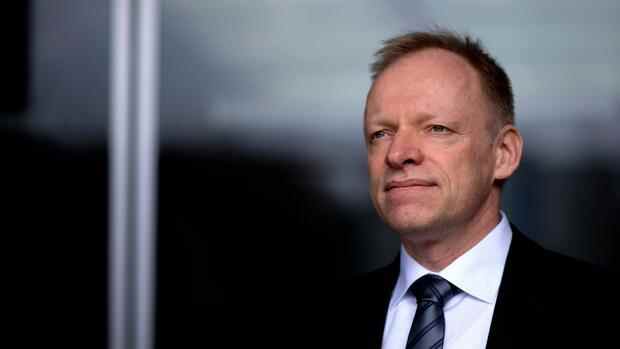The economist Clemens Fuest heads the Ifo Institute in Munich and calls on the ECB to scale back its bond purchases more quickly.
(Photo: Imago Images)
Berlin The yield on the trend-setting ten-year German government bond has risen above zero percent for the first time since May 2019. Clemens Fuest, President of the Ifo Institute, sees this as a positive sign for the economy. “The increase in yields signals a lower risk of recession,” Fuest told Handelsblatt.
Due to their low risk, investors often use German government bonds to avoid losses in value in crises. “Now that Bunds are becoming less popular, concerns about further crises are obviously decreasing,” explained Fuest. The markets would probably not take the omicron wave as having a bad impact on the economy.
The rise in yields is also seen as a sign of sustained high inflation. Fuest is therefore calling on the European Central Bank (ECB) to act. The ECB must reduce its bond purchases more quickly. “Then it would also be more flexible with the interest rate increases,” says the financial economist.
The ECB has so far followed the course of not wanting to change anything in the key interest rates until its bond purchase program has ended. According to Fuest, it must also remain so, because otherwise there is a risk of a decoupling of short-term and long-term interest rates: “Such a decoupling creates unnecessary uncertainty on the markets.”
Top jobs of the day
Find the best jobs now and
be notified by email.
Read the whole interview here:
Mr. Fuest, the yield on the ten-year federal bond is above zero percent again. Is this a turning point?
The yield has increased only minimally in the last few days. But it’s a small change with big symbolic value. The ten-year federal bond is the most important bond, and many other papers are based on it. And it bodes well for the economic recovery.
Why?
The rise in yields signals a lower risk of a recession. Bunds represent a safe haven for investors. In crises, they want to put their money in safety there, which causes yields to fall. Now that Bunds are becoming less popular, concerns about further crises are evidently decreasing. So the markets are unlikely to see the omicron wave as having a bad impact on the economy.
What does that mean in view of the loose monetary policy of the European Central Bank (ECB)?
The move into positive territory also signals that markets continue to expect high inflation. Investors are no longer willing to accept negative interest rates. The markets also seem to be expecting the ECB to intervene and tighten its course.
So far, the central bank has planned to scale back its bond purchases for the time being and not consider raising interest rates until 2023 or 2024 at the earliest.
Investors apparently think it’s possible that the ECB will move away from this, maybe even raise interest rates sooner. However, that would be risky. Short-term rates could thus rise while long-term rates remain low. Such a decoupling creates unnecessary uncertainty in the markets.
So, despite persistently high inflation, you wouldn’t change anything about the loose monetary policy?
Yes, the ECB would have to scale back its bond purchases more quickly. Then it would also be more flexible with interest rate increases.
However, the ECB has reasons not to do this: It is assuming significantly lower inflation rates from 2023 onwards.
But no one knows if that will happen. Of course, a central bank must also orientate itself towards medium-term inflation forecasts. Nevertheless, they must not ignore the current inflation. I would wish for a more balanced weighting from the ECB.
In view of the lack of income from negative bond yields, will the federal government have to tighten its belt in future?
No, we are currently only talking about a small increase. In addition, the federal government had not assumed long-term negative interest rates in its financial planning anyway.
However, the rise in bond yields in the US is more advanced. Doesn’t that also affect Germany?
Yes, there is a connection between US and German government bonds. If investors prefer US bonds due to better yield opportunities, the yields on German paper will of course increase. This can still be of importance for state finances. If, however, the German economy now enters an upswing phase, as anticipated by investors, tax revenues should be bubbling up anyway.
What does the evolution of bond yields mean for investors and what for borrowers?
Investors generally need to have stronger nerves because volatility is likely to rise in all asset classes. Borrowers must expect rising interest rates. This can be a risk for real estate investors, especially when rental income is rising at a slower rate than inflation.
Should those who want to buy or build a property privately hurry up with the financing?
No, I advise against that. Interest rates will not explode now. It is more important to find the right property and the right financing than to rush into it.
More: Yields on ten-year government bonds back above zero percent

